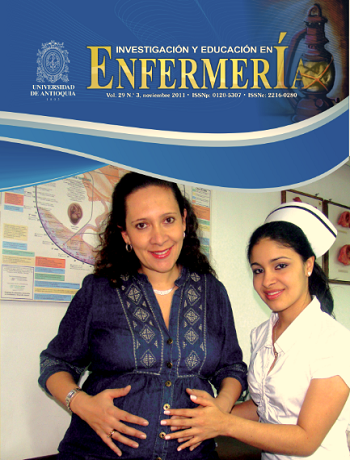Discourse genres and most frequent mistakes in academic reports of nursing students
DOI:
https://doi.org/10.17533/udea.iee.5030Keywords:
Writing; students, nursing; education.Abstract
Objective. To describe discourse genres most frequently used, and the most common mistakes in the construction of academic texts of nursing students of the Catholic University of Chile.
Methodology. Qualitative study carried out in 2006. 68 papers (27 individuals and 41 groups) were chosen. To identify the main genre in each text, the paper was characterized taking into account textual, discursive and pragmatic criteria. To identify the most frequent mistakes, they were reviewed according to the course they came from. Problems or mistakes categories were obtained by saturation.
Results. Discourse genres most frequently used by the students are case reports and bibliographic studies. Problems in the construction of the text were mainly linked to: inappropriate use of vocabulary, academic informality, and deficient construction of sentences.
Conclusion. The level of development of writing abilities is descriptive, existing deficiencies that deserve to be studied, aiming to develop strategies to decrease this problem.
Downloads
References
(1) Carlino P. Escribir, leer y aprender en la universidad: una introducción a la alfabetización académica. 4° reimpresión. Argentina: Fondo de Cultura Económica S.A; 2009.
(2) 2. Arnoux E, Nogueira S, Silvestre A. Comprensión macroestructural y reformulación resuntiva de textos teóricos en estudiantes de institutos de formación de docentes primarios. Rev Signos. 2011;39(60):9-30.
(3) Bajtín M. El problema de los géneros discursivos: en estética de la creación verbal. México: Siglo XXI; 1997.
(4) Lave J, Wenger E. Situated learning: legitimate peripheral participation. Cambridge: Cambridge University Press; 1991.
(5) Wenger E. Communities of practice: learning, meaning, and identity. Cambridge: Cambridge University Press; 1998.
(6) Hyland K. Genre-based pedagogies: a social response to process. J Second Lang Writ. 2003;12(1):17-29.
(7) McLeod SH. Translating enthusiasm into curricular change: new directions for teaching and learning. San Francisco: Jossey Bass; 1988. p. 5-12.
(8) Pollard RPF, Easter M. Writing across curriculum: evaluating a faculty-centered approach. J Lang Int bus. 2006; 17(2):22- 41.
(9) Pontificia Universidad Católica de Chile. Admisión y registros académicos. Programa de formación general [internet]. Santiago de Chile: Pontificia Universidad Católica de Chile. [acceso: 2009 ago 27]. Disponible en: http://dsrd.uc.cl/alumnos-uc/programas-de-estudios/proyecto-educativo/programa-de-formacion-general
(10) Blakeslee A, Hayes J, Young R. Evaluating training workshops in a writing across the curriculum program: method and analysis. Lang Lear Across Disciplines. 1994;1(2):5-34.
(11) Avila N, Arechabala MM, Catoni SMI. II Congreso Nacional de la Cátedra UNESCO, lectura escritura: Leer y escribir en la universidad y en el mundo laboral. Implementación de un programa de escritura a través del currículum en la Escuela de Enfermería de la Pontificia Universidad Católica de Chile. Osorno: Pontificia Universidad Católica de Chile; 2009.
(12) Oyanedel FM. Lo descriptivo en informes escritos de estudiantes universitarios. Onomázein. 2005;11(1):9-21.
(13) Bustamante S. El Proyecto de Investigación como texto: una experiencia etnográfica. Invest Postgrado. 2004;19(2):113-44.
Downloads
Published
Versions
- 2025-01-22 (2)
- 2011-11-28 (1)
How to Cite
Issue
Section
License

This work is licensed under a Creative Commons Attribution-NonCommercial-ShareAlike 4.0 International License.
Derechos de propiedad / Direitos de Propriedade
English: If the article is accepted for publication, all copyright will be of exclusive property of Investigación y Educación en Enfermería. The text and the graphics included in the publication are exclusive responsibility of the authors and not necessarily reflect the thought of the Editorial Committee.
Español: Si el artículo es aprobado para publicación, todos los derechos son de propiedad de Investigación y Educación en Enfermería. El texto y las gráficas incluidas en la publicación son de exclusiva responsabilidad de los autores y no necesariamente refleja el pensamiento del Comité Editorial.
Português: Se o artigo for aceito para publicação, todos os direitos autorais serão de propriedade exclusiva de Investigación y Educación en Enfermería. O texto e os gráficos incluídos na publicação são de responsabilidade exclusiva dos autores e não refletem necessariamente o pensamento do Comitê Editorial.















